Summary 
An intellectual comedy with shades of Beckett, a well-staged production of Tom Stoppard's 1967 inversion of Hamlet. Eschewing deeper notions of fate and doom for comical interludes with the characters from Elsinore, especially the Players, an entertaining if lighter-than-expected effort.
Design
Directed by Michael Halberstam. Set by Collette Pollard. Costumes by Rachel Anne Healy. Lights by Keith Parham. Original music and sound by Andrew Hansen.
Cast
Sean Fortunato (Rosencrantz), Timothy Edward Kane (Guildenstern), Allen Gilmore (The Player), Laura Coover (Ophelia), Brandon Ford (Hamlet), Terry Hamilton (Claudius), Karen Jones Woditsch (Gertrude), Fredric Stone (Polonius).
Analysis
Michael Halberstam, artistic director of Writers Theatre on the suburban north shore of Chicago, directs Tom Stoppard's Rosencrantz and Guildenstern are Dead in the larger of his company's two performance spaces. The actors are attired in the expected Elizabethan doublet and hose, and maritime ropes lie coiled at the edge of stage as if aboard ship or to raise theatre curtains. Anachronistic incidental rock music plays loudly as the production begins, a jarringly modern and pointedly self-conscious step back from Stoppard's Beckett-like version of Hamlet. Stoppard's and Halberstam's tragically unlucky heroes, Rosencrantz and Guildenstern, begin playing a coin flip game in various spotlights across the stage - "heads!" - as guitar chords crash during the brief intervals. The daunting game of chance - the coin always flips to heads - disconcerts but fails to truly frighten the two hapless friends of Hamlet, summoned to England.
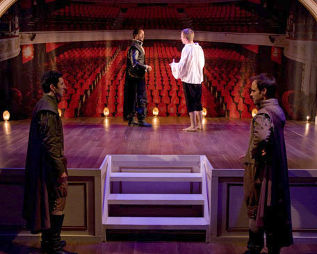
A flowing scarlet curtain upstage opens to reveal a three dimensional scrim of theatre seats as if the play takes place backstage at a theatre, another interesting choice by Halberstam to self-reflectively place the play within a play. Sean Fortunato's dim-witted Rosencrantz enjoys the coin-toss game, happily crying "heads!" and blinking rapidly like an idiot, then biting at his nails as the more cerebral Guildenstern rambles intellectually, concerned with the meaning of the unexpected twists in chance. Timothy Kane's Guildenstern vainly tries different moves, flipping a coin from under his leg, or slapping one down atop his head, but the coin flips turn up heads, always heads. Halberstam has his title characters gloss over the darker aspects of the uncanny twist, only remarking fleetingly on what it portents to their fates - quite unlike Shakespeare's Hamlet - and focuses more on comedic interplay.
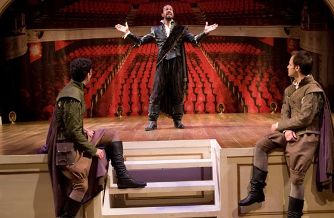
Rosencrantz and Guildenstern know they have been singled out by the newly crowned King of England, but before they can dwell too deeply, they hear distant music with drums and are soon joined by the gypsy-like musician-players and their flamboyant leader. The five bearded performers wear scarves and boots, led by the prancing Player in black leather. Fortunato's Rosencrantz makes formal introductions, but Kane's Guildenstern patiently whispers in his ear, and he realizes he has reversed their own names. Rosencrantz is also painfully slow to realize the traveling players are more than willing to prostitute themselves - "ohhh" - for a few coins. One of the players, a male actor in a blonde wig named Alfred, enacts all of their female roles, and after one last coin flip, Rosencrantz and Guildenstern watch the performers act onstage before joining them on their journey to the court at Elsinore. Rosencrantz's afterthought remark to Guildenstern carries some weight: "Good thing. It was tails."
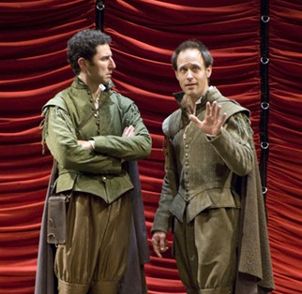
Halberstam renders good comedy from the interaction with Shakespeare's tragic characters at Elsinore, revealing the strangeness of the court's behavior through the bewildered perspective of Rosencrantz and Guildenstern, who know not what to do or what is expected of them. They stand by comically perplexed as the curtain draws and Hamlet and Ophelia race onstage to the upstage footlights, followed by Gertrude and Claudius in robes. They are particularly confused by their interaction with the babbling old Polonius: Rosencrantz remarks with some fear and a little dread, "I want to go home," as the distracted and apparently insane Hamlet crosses the stage in shirtsleeves, reading aloud to himself. Moments later their conversation is interrupted by Hamlet storming away from Polonius - "except my life!" - and to the anachronistic drums-and-guitars intro to the Talking Heads' 1970s "Burning Down the House," the production reaches the first of two intermissions.
The second act picks up right where the first act finishes, including the same incidental rock music, and Hamlet's intense and pointed parting comment - "I know a hawk from a handsaw" - only causes more bewilderment. Rosencrantz and Guildenstern make faces and spread their hands - "what?" - and Kane's Guildenstern draws the production's biggest laugh with his frustrated take on their Wittenberg school friend: "Half of what he said meant something else and the other half meant nothing at all!" He takes a moment to ponder the facts and the situation, and arrives at, "he's depressed."
With a Beckett-like lack of awareness of their situation or meaning, a la Estragon and Vladimir in Waiting for Godot, Rosencrantz and Guildenstern resolve to do something. Fortunato's Rosencrantz comically imitates Kane's Guildenstern's powerfully-thinking expression and rigid posture with his arms folded across his chest, then they become resolved and clap each other on the back in congratulations, although Guildenstern's only viable plan is, "let's do something constructive!" After Fortunato's Rosencrantz shouts "Fire!" and clears the stage - apparently to demonstrate the "misuse of free speech" - they witness Hamlet's strange interaction with the actors. The Player seems to feel their same sense of puzzlement, shouting, "we're actors! we're the opposite of people!" and Kane's Guildenstern cries back, "for god's sake, what are we supposed to do!" Again assessing the situation, he determines they are quite unlike the Danish court: "stark raving sane."
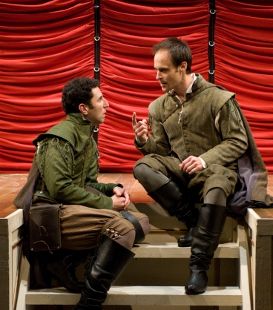
Guildenstern attempts in vain to grasp the gravity of their situation - "Eternity is a terrible thought. I mean, where's it gonna end?" - but is interrupted by Claudius and Gertrude's passionate struggle with the distraught Ophelia. When the Players loudly return to rehearse the mousetrap Murder of Gonzago for Hamlet, Kane's frustrated Guildenstern throws his hands in the air: "It's like living in a public park."
The comic confusion continues, Halberstam striking a delightfully absurdist note with the snippets of scenes from Hamlet, taken crazily out of context. When Hamlet and Ophelia storm the stage, he dismisses her with a cruel shout - "to a nunnery, go!" - and Guiildenstern can only remark, "that didn't look like love to me." The performance of The Murder of Gonzago carries with it great emotional weight that Rosencrantz and Guildenstern can of course only fail to understand. They watch from the periphery, and amid quick comedy - "stop picking your nose, Alfred" - the performance concludes with Claudius' electronically amplified shout of "give me some light!" that ends abruptly in, of course, a blackout. The lights re-rise upon Rosencrantz and Guildenstern, ironically now in the same onstage positions as the dead characters from the performance. Kane's Guildenstern notices the foreboding irony, but can only comment in confused trepidation: "Well. Quite. Well, well. Quite, quite."
After Hamlet reappears, now dragging the body of the murdered Polonius to the stairs and then down, rudely bouncing the man's head on the steps, they are ordered to escort Hamlet to England. Along with Hamlet, they meet soldiers from the Norwegian army on their way to battle in Poland, unlike Hamlet failing to see the significance of waging a meaningless war to assuage vengeful bloodlust. After the second intermission, white railings are added downstage like those on the deck of a sea ship, and Hamlet lounges in a deck chair beneath an umbrella, a blanket over his legs, sipping a drink from half a coconut. When the weary and woefully confused Rosencrantz and Guildenstern fall asleep downstage, Hamlet blows out the candle next to him and amid ominous drumbeats, replaces the letter that demands his beheading while they sleep. Halberstam chooses to diminish the tragic impact of the deceit with another comic moment: the resolved Prince walks to the ship's railing and spits out into the North Sea, only to flinch as if the wind has blown it back into his face.
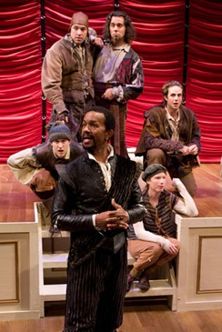
Halberstam concludes the production at a quick pace, with the title characters as doomed as Hamlet. They play a guessing game, with Fortunato's Rosencrantz concealing a coin in one fist and Kane's Guildenstern guessing at which hand conceals the coin. Bonding in their mutual bewilderment - and apparent fate - Rosencrantz is discovered to be concealing two coins so his friend will always choose correctly and hopefully be happy. Fortunato's Rosencrantz then half-embraces the too-exhausted-to-be annoyed Guildenstern across the shoulders. Before the assault from pirates, Kane draws another hearty laugh with his disbelief in the actual existence of England - "I don't believe in it; a conspiracy of cartographers" - and they are joined again by the Player and his acting troupe. The performers emerge from whiskey barrels on either side of the stage, several from one barrel like modern clowns. Kane delivers another wicked Stoppard line - "the sun is going down, or the earth is coming up, as the fashionable theory has it" - before they realize they are to be beheaded by order of the King of England. The absurdist comedy concludes with an abrupt blackout, but the lights re-rise at Elsinore, with all of the Danish court lying tragically dead in their familiar positions across the stage as an unseen ambassador intones that "Rosencrantz and Guildenstern are dead." Halberstam then fades the lights out on an entertaining and amusing production pointedly more akin to Beckett's theatre of the absurd than to Hamlet's philosophy of fate.